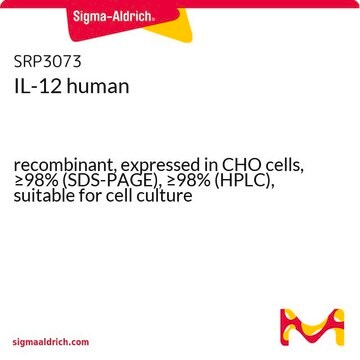L3408
Transforming Growth Factor-β1 Latency Associated Peptide human
≥97% (SDS-PAGE), recombinant, expressed in Sf21 cells, lyophilized powder, suitable for cell culture
Synonyme(s) :
LAP, TGF-β1
About This Item
Produits recommandés
Source biologique
human
Niveau de qualité
Produit recombinant
expressed in Sf21 cells
Pureté
≥97% (SDS-PAGE)
Forme
lyophilized powder
Poids mol.
protein 70 kDa
Technique(s)
cell culture | mammalian: suitable
Impuretés
endotoxin, tested
Adéquation
suitable for molecular biology
Numéro d'accès UniProt
Température de stockage
−20°C
Informations sur le gène
human ... TGFB1(7040)
Description générale
TGF-β is released from degranulating platelets and secreted from nearly all cells in a biologically inactive complex which is unable to bind to cellular receptors and is not recognized by antibodies to TGF-β. The peptide can be activated by acidification, alkalinization, or action of chaotropic agents in vitro. The complex consists of TGF-β associated non-covalently with a protein designated as the latency associated peptide (LAP). TGF-β and LAP represent components of a pro-peptide that is cleaved in a post-golgi compartment prior to secretion. The recombinant human LAP is produced from a DNA sequence corresponding to the 278 amino acid residues of pre-pro-TGF-β1 terminating prior to the mature TGF-β1. LAP contains a Cys33 to Ser33 substitution. LAP contains 249 amino acids, generated after cleavage of a 29 amino acid residue signal peptide. LAP is a glycoslyated, disulfide linked homodimer.
Application
Actions biochimiques/physiologiques
Forme physique
Remarque sur l'analyse
Clause de non-responsabilité
Code de la classe de stockage
11 - Combustible Solids
Classe de danger pour l'eau (WGK)
WGK 3
Point d'éclair (°F)
Not applicable
Point d'éclair (°C)
Not applicable
Équipement de protection individuelle
Eyeshields, Gloves, type N95 (US)
Certificats d'analyse (COA)
Recherchez un Certificats d'analyse (COA) en saisissant le numéro de lot du produit. Les numéros de lot figurent sur l'étiquette du produit après les mots "Lot" ou "Batch".
Déjà en possession de ce produit ?
Retrouvez la documentation relative aux produits que vous avez récemment achetés dans la Bibliothèque de documents.
Notre équipe de scientifiques dispose d'une expérience dans tous les secteurs de la recherche, notamment en sciences de la vie, science des matériaux, synthèse chimique, chromatographie, analyse et dans de nombreux autres domaines..
Contacter notre Service technique




